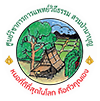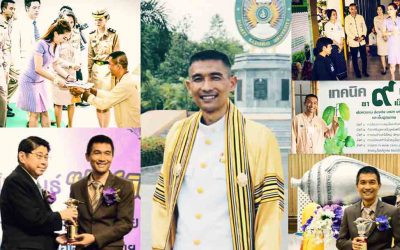รูปแบบการบริหารงานเชิงระบบโครงการสร้างศักยภาพพึ่งตนจิตอาสาแพทย์วิถีธรรม
นางสาวหมายขวัญพุทธ กล้าจน
วิทยานิพนธ์นี้เป็นส่วนหนึ่งของการศึกษาตามหลักสูตรปรัชญาดุษฎีบัณฑิต
สาขาวิชายุทธศาสตร์การพัฒนาภูมิภาค
บัณฑิตวิทยาลัย
มหาวิทยาลัยราชภัฏอุบลราชธานี พ.ศ. 2564
- ชื่อเรื่อง : รูปแบบการบริหารงานเชิงระบบโครงการสร้างศักยภาพพึ่งตนจิตอาสาแพทย์วิถีธรรม
- ผู้วิจัย : นางสาวหมายขวัญพุทธ กล้าจน
- ปริญญา : ปรัชญาดุษฎีบัณฑิต
- สาขาวิชา : ยุทธศาสตร์การพัฒนาภูมิภาค
- อาจารย์ที่ปรึกษาวิทยานิพนธ์หลัก : ผู้ช่วยศาสตราจารย์ ดร. จิตรกร โพธิ์งาม
- อาจารย์ที่ปรึกษาวิทยานิพนธ์ร่วม : อาจารย์ ดร. กิติรัตน์ สีหบัณท์
บทคัดย่อ
การวิจัยนี้มีวัตถุประสงค์เพื่อศึกษารูปแบบการบริหารงานเชิงระบบโครงการสร้างศักยภาพพึ่งตนจิตอาสาแพทย์วิถีธรรมการวิจัยมี 3 ระยะดังนี้
ระยะที่ 1 การศึกษาสภาพการบริหารงานเชิงระบบโครงการสร้างศักยภาพพึ่งตนจิตอาสาแพทย์วิถีธรรม กลุ่มเป้าหมายมี 2 กลุ่ม กลุ่มที่ 1 เป็นกลุ่มจิตอาสามี 4 ระดับ คือ จิตอาสาคบคุ้น จิตอาสาเตรียม จิตอาสาจร จิตอาสาประจำจำนวน 16 คน กลุ่มที่ 2 คือจิตอาสาประจำที่เป็นคณะกรรมการมีฐานะเป็นหัวหน้าและพี่เลี้ยงจำนวน 15 คน
ระยะที่ 2 การพัฒนารูปแบบการบริหารงานเชิงระบบโครงการสร้างศักยภาพพึ่งตนจิตอาสาแพทย์วิถีธรรม กลุ่มเป้าหมายคือผู้ทรงคุณวุฒิ ในระดับกำหนดนโยบายขององค์การ จำนวน 7 คน และทดลองใช้รูปแบบโดยกลุ่มเป้าหมาย คือ ผู้บำเพ็ญภาคเหนือยังไม่ได้เป็นจิตอาสาจำนวน 60 คน
ระยะที่ 3 การประเมินผลรูปแบบกลุ่มเป้าหมายคือ ผู้เชี่ยวชาญที่มีความรู้และประสบการณ์ ด้านพัฒนาทรัพยากรมนุษย์แนวพุทธ การแพทย์วิถีธรรมและการพัฒนาสังคม จำนวน 17 คน เครื่องมือที่ใช้ได้แก่ แบบสอบถาม แบบสัมภาษณ์แบบประเมินรูปแบบ สถิติที่ใช้ได้แก่ ร้อยละ ค่าเฉลี่ยส่วนเบี่ยงเบนมาตรฐาน การทดสอบทีและวิเคราะห์เนื้อหา
ผลการวิจัย
รูปแบบการบริหารงานเชิงระบบโครงการสร้างศักยภาพพึ่งตนจิตอาสาแพทย์วิถีธรรมมี 6 องค์ประกอบได้แก่ 1. หลักการ 2. ปณิธาน 3. วัตถุประสงค์ 4. ดำเนินการ 5. ประเมินผลและ 6. เงื่อนไขในความสำเร็จ โดย
- หลักการ คือ การบริหารทรัพยากรมนุษย์แนวพุทธด้วย 7 พลัง พวธ. เป็นพลังพุทธะ เป็นศักยภาพพึ่งตนจิตอาสา
- ปณิธาน คือการพึ่งตนช่วยคนทั่วโลก
- วัตถุประสงค์เพื่อสร้างศักยภาพพึ่งตนจิตอาสาเพื่อสืบสานพระพุทธศาสนา
- การดำเนินการ มี 5 วิธี ได้แก่
- 1) บริหารทรัพยากรมนุษย์แนวพุทธโดย สรรหา ธำรงรักษา อบรมพัฒนาและคัดคนออก
- 2) จัดการความหลากหลายของบุคลากรจิตอาสาด้วยการเคารพผู้นำและฟังมติหมู่
- 3) พัฒนาบุคลากรให้ความรู้ ได้เรียนรู้ เรียนรู้ในพื้นที่ปฏิบัติจริง
- 4) จิตอาสานักพัฒนาที่ดีมีศีล
- 5) บริหารสร้างพันธมิตรเครือข่ายเรียนรู้ร่วมกันอย่างญาติพี่น้อง
- ประเมินผลความเข้าใจประยุกต์ใช้คำสอนในพระไตรปิฎกชำนาญทำงานอย่างสัมมาทิฎฐิ เชี่ยวชาญขัดเกลากิเลสและปรับสู่อุปนิสัยเป็นบุคคลวรรณะ 9
- เงื่อนไขในความสำเร็จ คือการมีอุดมการณ์ร่วมกัน ได้แก่ คนร่างกายแข็งแรงมีกำลัง จิตใจดีงามจิตใจเป็นสุข พึ่งตนเรียบง่ายคบเคารพมิตรดีเกื้อกูลแบ่งปันทำงานฟรีและ อ่อนน้อมถ่อมตน
A System-BasedAdministration Model ofthe Self–Reliant Potential Building Project
Maikwanphut Klajon
A Dissertation Submitted in Partial Fulfillment
of the Requirements for the Doctor of Philosophy Degree
in Regional Development Strategies Graduate School,
Ubon Ratchathani Rajabhat University 2021
ABSTRACT
This research aimed to study a system–based administration model of the self–reliant potential building project for Dhamma way medicine volunteers. The research was conducted into 3 phases.
The first phase was to study the states of the system–based administration of the self–reliant potential building project for Dhamma way medicine volunteers. There were two target groups. The first group consisted of 16 volunteers in 4 levels: familiarity, preparation, casual irregular and regular volunteers. The second group consisted of 15 routine volunteers who were the committees with the positions of the chiefs and mentors of the volunteers’ groups.
The second phase was to develop a system-based administration model of the self–reliant potential building project for Dhamma way medicine volunteers. The target group consisted of 7 experts who worked in the organizational policy–setting level and the target group consisted of 60 non–volunteers in the northern region who tried out the model.
The third phase was to evaluate the model. The target group consisted of 17 experts who had knowledge and experience in developing human resources in a Buddhist way, Dhamma way medicine and social development. The research instruments were a questionnaire, an interview form, and an evaluation form. The statistics used were percent age, mean, standard deviation, t–test and content analysis.
The research findings were as follows :
The system-based administration model of the self–reliant potential building project for Dhamma way medicine volunteers consisted of 6 components: 1. principles, 2. determination, 3. objectives, 4. operation, 5. evaluation and 6. Conditions for success.
The first component, the principles, referred to the administration of the Dhamma way human resources with the seven powers of the Dhamma way medicine which were the Buddhist power and the potential of the self-reliant volunteers.
The second component, the determination, referred to the self-reliance to help people around the world.
The third component, the objectives, was to build self–reliant potential volunteers to continue Buddhism.
The fourth component, operation, consisted of 5 methods:
1) administrating human resource based on Buddhist ways by recruiting, maintaining, training and developing and retiring bad employees,
2) managing a diversity of volunteers with respecting the chiefs and listening to public opinions,
3) developing personnel to have knowledge, to learn and to practice in the real situations,
4) being volunteers and good developers with precepts and
5) administrating to build network partnership to learn together like brothers and sisters.
The fifth component, evaluation, referred to the evaluation on understanding the fluent use of the doctrines in Tripitaka with the right view, on expertizing to refine passion and on adjusting habits to be the ninth personal class.
The sixth component, conditions for success, referred to common ideology, namely, being strong and healthy people, having kind and happy minds, being self-reliant, simple and friendly people, sharing, working for free and being polite people.
วิธีใช้ Embed PDF
- กรุณากดลูกศร ซ้าย-ขวา ในการเปลี่ยนหน้า
- ถ้าหากตัวอักษรเล็ก-ใหญ่เกินไป กรุณากดเครื่องหมาย บวก-ลบ เพื่อปรับขยาย-ลดตัวอักษร
ประวัติผู้วิจัย
| ชื่อ –สกุล | นางสาวหมายขวัญพุทธ กล้าจน |
| วัน เดือน ปี เกิด | 15 ธันวาคม 2508 |
| สถานที่เกิด | โรงพยาบาลหญิง (ราชวิถี) อำเภอบางกอกน้อย จังหวัดกรุงเทพมหานคร |
| สถานที่อยู่ปัจจุบัน | 31 / 1 ตำบลป่าแป๋ อำเภอ แม่แตง จังหวัดหวัด เชียงใหม่ 50150 |
| ตำแหน่งหน้าที่การงานปัจจุบัน | • ข้าราชการบำนาญ กระทรวงสาธารณสุข • จิตอาสาแพทย์วิถีธรรม เข้ามาเป็นจิตอาสา ปี พ.ศ. 2554 • จิตอาสาแพทย์วิถีธรรม |
| สถานที่ทำงานปัจจุบัน | มูลนิธิแพทย์วิถีธรรมแห่งประเทศไทย 31 / 1 ตำบลป่าแป๋ อำเภอ แม่แตง จังหวัดหวัด เชียงใหม่ 50150 |
| ประวัติการศึกษา | |
| พ.ศ. 2525 | มัธยมศึกษาตอนปลาย โรงเรียนสตรีวัดระฆัง แขวงศิริราช เขตบางกอกน้อย จังหวัดกรุงเทพมหานคร |
| พ.ศ. 2530 | สาธารณสุขศาสตรบัณฑิต บริหารธุรกิจบัณฑิต สาขาวิชาการโฆษณา–การประชาสัมพันธ์ มหาวิทยาลัยรามคำแหง แขวงหัวหมาก เขตบางกะปิ กรุงเทพมหานคร |
| พ.ศ. 2558 | การศึกษา อาริยปัญญาตรี สถาบันวิชชาราม หลักสูตร 7 ปี จิตอาสาแพทย์วิถีธรรม สาขาแพทย์วิถีธรรม |
| พ.ศ. 2559 | วิทยาศาสตรมหาบัณฑิต สาขาวิชาสาธารณสุขศาสตร์ มหาวิทยาลัยราชภัฏสุรินทร์ |
| พ.ศ. 2564 | ปรัชญาดุษฎีบัณฑิต สาขาวิชายุทธศาสตร์การพัฒนาภูมิภาค มหาวิทยาลัยราชภัฏอุบลราชธานี ตำบลในเมือง อำเภอเมือง จังหวัดอุบลราชธานี |


